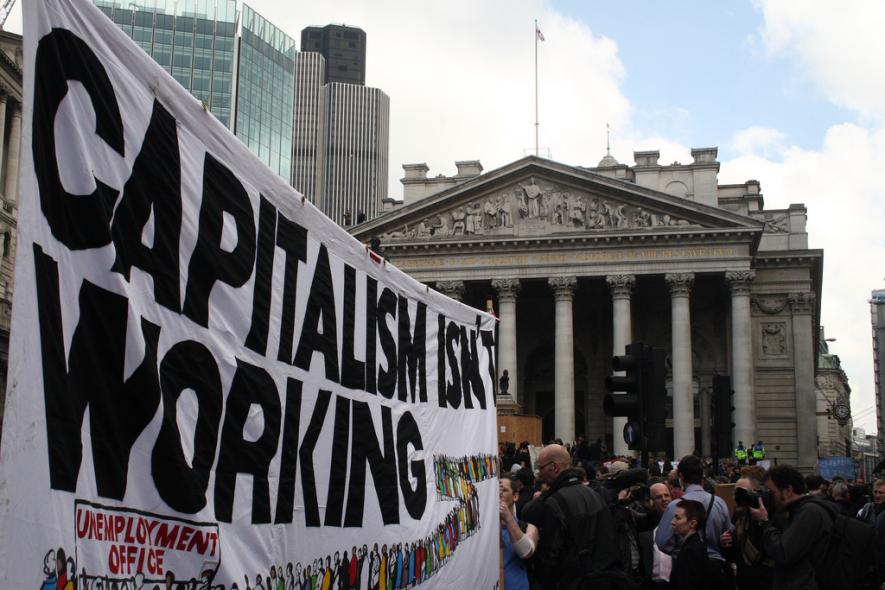Many Terms That Are Frequently Used to Describe Capitalism Simply Don’t Hold Up Under Scrutiny

Capitalism is not, as its defenders like to claim, defined by “free” or “private” enterprises. Likewise, “free” or “unregulated” markets do not define capitalism. Politics and ideology drive its defenders to choose those definitions over clearly better, different definitions. The causes and consequences of conflicts over definition are part of today’s mounting battles over capitalism.
The task of any definition is to separate its object from others, to expose its uniqueness so all can recognize it and distinguish it from other, similar objects. We define “dog” to differentiate it from other animals, “chair” from other furniture, and “Mary” from other people. We should then define capitalism to differentiate it from other economic systems (the organized production and distribution of goods and services in a community) around qualities unique to it.
A key unique quality of capitalism is the employer/employee relationship between two different groups of the people engaged together in the economic system. That relationship entails an exchange of wages or salaries for labor power (the ability of an employee to work). A contract between employer and employee covers that exchange plus the employee’s exertion of brains and muscles over lengths of time and to ends specified by the employer. Capitalism’s unique employer/employee relationship distinguishes it, for example, from slavery, feudalism, and communism as alternative economic systems.
In slave economic systems, the key relationship is one of master and slave, where the slave is the property of the master or a third person. This differs clearly from capitalism, where no person is another’s property. Capitalism contrasts equally clearly with feudalism, where the key relationship links lord and serf by their sworn acceptance of specific obligations, loyalties, and duties to one another. Wages do not exist in either slave or feudal economic systems. Marx’s gestures toward communism entail a key relationship radically different from that of the capitalist, feudal, or slave economic systems. In communism, no split or division occurs between two different groups of participants in production (no masters and slaves, lords and serfs, or employers and employees). Instead one and the same community designs, directs, and performs the work of an enterprise such that each community member has one vote and enterprise decisions are made democratically. Worker coops are the form in which that economic system is most often encountered in the modern world.
The employer/employee relationship structuring enterprises thus serves nicely and neatly to define capitalism as distinct from alternative economic systems. In contrast, other current definitions of capitalism fail to make such distinctions. Mainstream media, politicians, and most professional economists in the United States define capitalism above all in terms of “private” or “free” enterprises and “free” or “unregulated” markets. But those definitions are inadequate and inappropriate; they do not distinguish capitalist from other economic systems.
That is because private enterprises exist in them all. An enterprise is private if the individuals who own and operate it hold no positions within any governmental apparatus or agency. A state enterprise would then be one owned and/or operated by officials or other persons holding positions within state apparatuses or agencies.
In today’s U.S. capitalism, state capitalist enterprises include the Post Office, Amtrak, the Tennessee Valley Authority, countless municipal transport systems, state schools, and so on. These coexist with private capitalist enterprises. Both are capitalist because both embody the same basic employer/employee relationship. Slave systems likewise display both private and state slave enterprises, and feudal systems include both private and state feudal enterprises. In modern socialist systems ranging from Scandinavia to the USSR and the People’s Republic of China, both private and state enterprises have coexisted. Because of their shared employer/employee relationships, they deserve to be called private and state capitalist enterprises notwithstanding their “socialist” labels. Indeed, those labels reveal that some socialist critics of capitalism did not question its defenders’ definitions. In my view, that weakened their critiques. Lastly, instances of communist enterprises, where the worker coop relationship displaces the employer/employee relationship, have been scattered but are relatively rare across the modern world.
The proportions of private versus state enterprises have varied from system to system. They have also varied within each system from time to time and region to region. Private enterprise is thus not an effective definition of capitalism. Its presence does not distinguish capitalism from the other systems.
Much the same analysis applies to free markets where buyers and sellers exchange with minimal outside interference. Free markets have almost always coexisted in varying proportions with planned state interventions to limit or regulate exchanges: free markets versus planning. Markets have existed for a long time in human history, not just during the times of capitalism. In slavery, for example, slaves and what slaves produced, such as cotton, passed through markets; they were distributed via market exchanges. Sometimes those markets were relatively free; sometimes states intervened to control them. Lords and serfs interacted in markets where many products of feudal economies were exchanged. Those markets were also sometimes free and sometimes not. Socialist societies, whatever their mix of capitalist and worker coop-type enterprises, have likewise combined free markets and state planning.
In short, all the systems under discussion here display mixtures of free markets and planning. We cannot definitionally distinguish capitalism from them along the lines of free markets versus state planning.
Why then did an inadequate definition prevail in mainstream discussions and popular usage over an available, better one? The answer hinges on ideology. The defenders of capitalism preferred the inadequate definition because it was far easier to defend capitalism if and when it was defined that way. The defenders had the resources—supportive capitalists’ wealth, power, and cultural influence—to make their preferences prevail.
The definition of capitalism in terms of the employer/employee relationship is difficult to defend for several reasons. First of all, it renders capitalism as patently undemocratic. In capitalist workplaces (factories, offices, and stores) an unaccountable minority (owners, boards of directors, top executives) wield nearly absolute power over the enterprise. They decide what, how, and where to produce and what to do with the net revenues produced by the employees. The latter are the majority inside enterprises. Yet the employees must live with the results of enterprise decisions from which they are excluded. Especially in countries with some democratic traditions or aspirations, defending so undemocratic a workplace structure—and the capitalism it grounds—would be difficult.
Second, the dualistic employer/employee definition of capitalism suggests affinities with the parallel dualisms of slavery (master/slave) and feudalism (lord/serf). The history of the revolutionary breaks of capitalism from feudalism and slavery (French and American revolutions, U.S. Civil War, and so on) illustrates that revolutionaries then thought their breaks were deep and dramatic. Liberty, equality, fraternity, and democracy were the slogans and banners of those breaking to capitalism. Those who favor capitalism have always nurtured and reaffirmed its association with those slogans. In contrast, the employer/employee definition suggests rather that the master/slave and lord/serf dualisms have a modern-day parallel or equivalent in the employer/employee dualism. Using that definition, one might infer that perhaps some further break—say beyond any dualism—belongs on history’s agenda.
Third, defining capitalism in terms of “free” or “private” enterprises and markets foregrounds and celebrates certain citizens enjoying “liberty” from an oppressive state. That definition is often extended to include individual initiative, as in “freedom” to establish one’s own business enterprise, and an “incentive system” where profit rewards successful business ventures. This definition of capitalism identifies its uniqueness in its enabling, protecting, and guaranteeing all individuals the freedom to start and grow their own enterprises to earn profits without state interference. In this definition, all other systems (and especially socialism) constrict and constrain those freedoms. In historical fact, individuals in various slave, feudal, and other economic systems have sometimes faced quite parallel incentives to start new enterprises. Capitalism has also, to varying degrees in various times and places, stifled incentives and blocked enterprise freedoms, for example via its patent and trademark laws, tendencies to monopoly, inequality, business cycle downturns, and so on.
Definitions are shaped by and react back upon the contexts and conflicts of their times and places. The old, conservative definition of capitalism is now contested, as is everything else about that system. By articulating now an overdue refutation of its prevailing definition, the critique of capitalism deepens.
Richard D. Wolff is professor of economics emeritus at the University of Massachusetts, Amherst, and a visiting professor in the Graduate Program in International Affairs of the New School University, in New York. Wolff’s weekly show, “Economic Update,” is syndicated by more than 100 radio stations and goes to 55 million TV receivers via Free Speech TV. His two recent books with Democracy at Work are Understanding Marxism and Understanding Socialism, both available at democracyatwork.info.
This article was produced by Economy for All, a project of the Independent Media Institute.
Get the latest reports & analysis with people's perspective on Protests, movements & deep analytical videos, discussions of the current affairs in your Telegram app. Subscribe to NewsClick's Telegram channel & get Real-Time updates on stories, as they get published on our website.




















